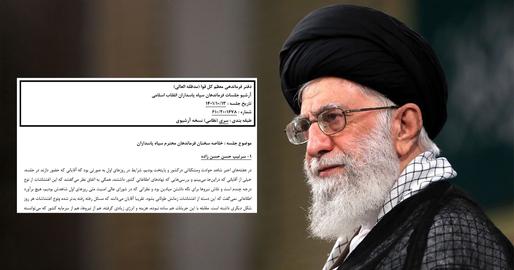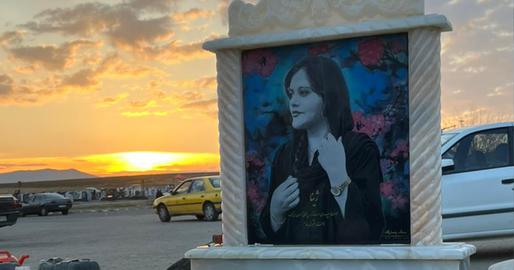Agitated elements within the Islamic Revolutionary Guard Corps (IRGC) tried to target Supreme Leader Ayatollah Ali Khamenei’s residence with artillery at least once since the start of Iran’s recent protests, as frustration grows within the armed forces over the situation, IranWire can reveal.
And during a January 3 meeting with the Supreme Leader, commanders within the Revolutionary Guards expressed their frustration over the ongoing protests and warned Khamenei about the Islamic Republic’s future.
IranWire has obtained a confidential report detailing the meeting, called to mark the third anniversary of the killing of Qassem Suleimani, the late commander of the IRGC’s expeditionary Quds Force.
During the meeting, held fourth months after the start of the protests sparked by the death in police custody of Mahsa Amini, senior IRGC commanders gave Khamenei a concerned assessment of Iran's security situation. Fifty-eight commanders and security officials were present and all but 13 gave speeches over the course of four hours.
Some commanders confirmed that most of the forces under their command refused to stand against the Iranian people and had rejected orders to shoot at civilians.
The commanders also warned Khamenei about a drop in troop morale and a rise in conflicts among rank-and-file IRGC officers.
"Based on our reports, it appears that IRGC forces are not in the same situation as last year, particularly with respect to their morale, as there has been a decline,” Abdullah Haji Sadeghi, Khamenei’s representative within the IRGC, told the meeting.
“We have gathered information and statistics from various units across divisions, which reveal the existence of conflict [within the ranks]. This must be managed properly. It is important to note that we are not talking about just one or two individuals, but rather an armed force consisting of over 600,000 personnel,” he warned the Supreme Leader and his commanders.
Mojtaba Khamenei, the Supreme Leader’s son, has played a significant role in directing and controlling security and military forces during the protests. But some commanders voiced opposition to his decisions and actions during the meeting.
The leaked report also indicates that the main topic of discussion during the meeting was a fall in the security capacity and strength of the Islamic Republic, which was attributed to a lack of budget and resources.
Commanders also discussed corruption and widespread misconduct among senior armed forces. Such problems are understood to have contributed to worsening disagreements and criticism among personnel in these units.
During the meeting, for example, the deputy commander of the IRGC force in Alborz, Ehsan Khorshidi, warned colleagues about frustration among his troops.
“Recently, we have witnessed instances of disruption and aid by armed forces towards civilians,” he said, adding that a week before the meeting, a group of conscripts and a lieutenant in the Alborz units had staged a theft from a military storage facility.
But “upon investigation, security forces concluded that there was no robbery, and the agents responsible for the transfer [of items] had distributed everything among the underprivileged neighborhoods of Karaj. The suspects are currently in custody, but we're unsure of how to proceed,” Khorshidi added.
Almost all the commanders agreed that finding more financial resources was crucial for the Islamic Republic to carry on.
According to Mahmoud Mohammadi Shahroudi, the commander in charge of paramilitary Basij seminary students, who also spoke at the meeting, around 5,000 members have left the organization in recent months.
"I believe that the recent issues of abandoning religious clothing, as well as conflicting beliefs among students and clerics in the last two months, may have been a surprise not only to representatives of the Supreme Leader, but also to the jurists and religious-political bodies of the IRGC,” Shahroudi told the meeting.
Another speaker, Gholamali Rashidi, warned of a bigger challenge for the Islamic Republic.
“Since the start of the protests, we have had personnel who have defied orders,” Rashidi said.
“One incident involved an individual targeting the Supreme Leader’s residence with artillery. Thanks to the immediate response of our fellow members in the unit, the perpetrators were identified and apprehended,” he added.
A series of decisions were taken during the meeting to address the situation, with Khamenei instructing commanders to announce them over the following weeks.
These included the release of a large number of detainees, a 52 percent increase in the budgets for the IRGC, military, and intelligence forces, and an exemption of all ranks of the Basij from paying taxes for electricity, gas, water and income taxes.
On the same day as the meeting, a ceremony was held at a mosque in Tehran in memory of Qassem Suleimani, attended by several IRGC commanders and a speech given by President Ebrahim Raisi. The ceremony corroborates IranWire’s report that at least some of these commanders were in Tehran on that day.
The presence of Quds Force commanders at the meeting is notable given that it coincided with the anniversary of Suleimani's death.
The report is also consistent with Khamenei's positions – but comparing his remarks from both before and after the meeting can reveal any changes in policy.
In his last public speech, on November 26, 38 days before the meeting, Khamenei threatened protestors by referring to them as "rioters" and warning the country about Iran’s enemies.
But during a public speech on January 4, one day after the meeting, Khamenei’s tone was markedly different.
"I was on a provincial trip and people came out to welcome me,” Khamenei said. “I noticed that at least a third of the population, including women who weren't wearing good hijab, were shedding tears. It's not fair to label them as counter-revolutionary or anti-revolutionary. How can anyone criticize their enthusiasm and eagerness to participate in religious or revolutionary ceremonies?”
“They are our daughters,” he added.
A full transcript of the meeting in Persian is available here.
visit the accountability section
In this section of Iran Wire, you can contact the officials and launch your campaign for various problems

























comments